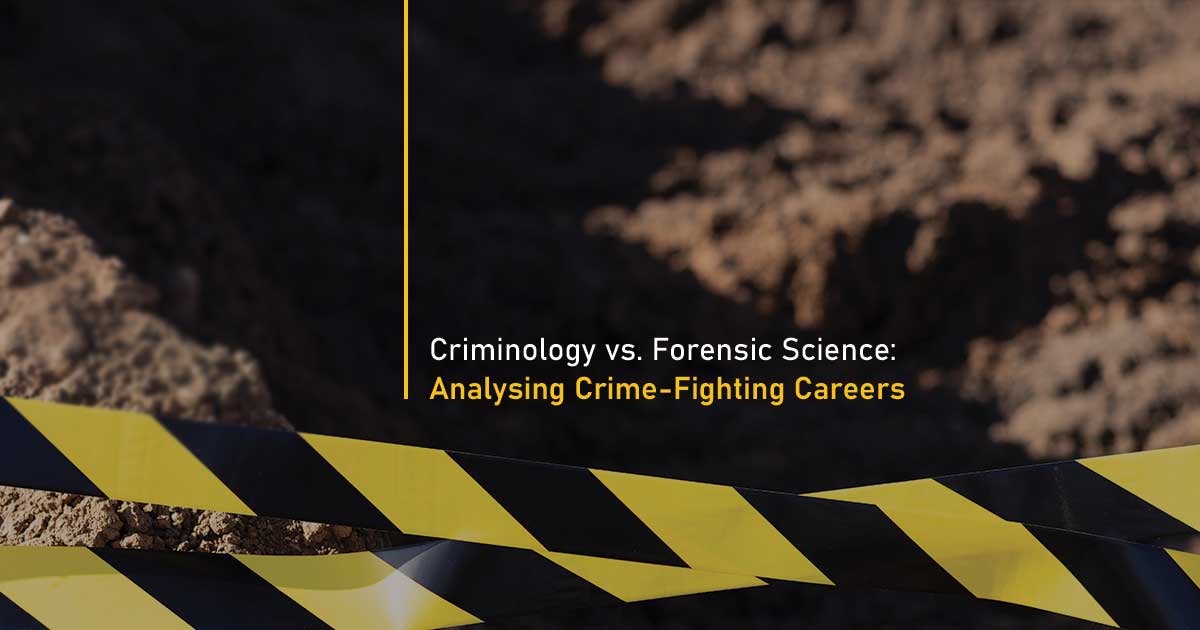Blog Detail


Criminology vs. Forensic Science: Analysing Crime-Fighting Careers
30-10-2023

Forensic science and criminology are two independent fields of study that cover sociological and scientific aspects of crime backed by scientific evidence. Criminology focuses on analysing the nature, causes and prevention of criminal behaviour that can disintegrate the social structure. On the other hand, forensic science deals with understanding scientific principles and techniques to investigate crime from its root. While the former has a sociological approach, the latter is a scientific field of study. In this article, we shall dive deeper into both the fields and explore the differences between these career pathways!
Criminology vs. Forensic Science: Course Duration
The undergraduate (UG) courses offered in the field of criminology include a Bachelor of Arts (B.A) in the same field, with a duration of 3 years, and 6 semesters. Furthermore, individuals can pursue a post-graduate degree by enrolling for a Master of Arts (M.A) in criminology. The duration of this MA programme is 2 years, further split across 4 semesters.
In the case of forensic science, students can opt for a Bachelor of Science (B.Sc) in forensic science as an undergraduate programme. The duration of this degree is 3 years, further split across 6 semesters. Just like criminology, students can also pursue a Master of Science (M.Sc) in the same field. The duration of this post-graduate programme is 2 years, further divided into 4 semesters.
Criminology vs. Forensic Science: Course Curriculum
The curriculum of criminology has a focus on social sciences subjects such as sociology, psychology, law and criminal justice. This discipline helps the students to gain domain knowledge on the root cause of a crime, and criminal behaviour patterns. The core subjects included in a criminology curriculum are as follows:
- Criminal Behaviour
- Criminological Theories
- Criminal Justice System
- Crime Prevention
- Criminal Law
- Victimology
- Juvenile Delinquency
- Penology (study of punishment)
- White-Collar Crime
- Cybercrime
- Criminal Profiling
On the other hand, the curriculum in a forensic science programme is a blend of science subjects such as biology, physics, and chemistry. Students tend to learn the application of scientific techniques to solve and interpret crime scenes. The core subjects included in a criminology curriculum are as follows:
- Forensic Biology
- Forensic Chemistry
- Forensic Toxicology
- Forensic Pathology
- Fingerprint Analysis
- DNA Analysis
- Ballistics and Firearms Examination
- Trace Evidence Analysis
- Digital Forensics
- Forensic Anthropology
- Forensic Entomology
Criminology vs. Forensic Science: Career Opportunities
Upon graduation in criminology, individuals can pursue careers in law enforcement, criminal justice, social work, corrections, victim advocacy, and policy analysis. The other job roles can be police officers, probation officers, crime analysts, or criminal investigators. Let us see some of the lucrative career roles in this field:
- Law Enforcement Officer: Law Enforcement Officers execute criminal investigations by gathering evidence, interviewing victims and witnesses, and interrogating suspects.
- Criminal Investigator: Criminal investigators investigate crimes and provide law enforcement bodies with evidence that could lead to an arrest.
- Corrections Officer: Corrections Officers supervise the activities of inmates in detention facilities and provide care and correctional treatment of inmates.
- Parole Officer: Parole Officers contact parolees on a regular basis, monitor the location of parolees, and assess the risk that they pose to the general public.
- Crime Scene Analyst: Crime Scene Analysts are responsible for assisting law enforcement officials by collecting evidence from a crime scene for future analysis.
If an individual wishes to explore a career in forensic science, they can take up roles such as forensic scientists, crime scene investigators, forensic analysts, and forensic pathologists. These individuals can also be recruited by private and public law enforcement agencies, and other firms to solve crimes and decide the evidence. Let us see some of the exciting career opportunities in this domain:
- Forensic Toxicologist: Forensic toxicologists perform scientific tests on bodily fluids and tissue samples to identify any drugs or chemicals present in the body.
- Forensic Odontologist: Forensic odontologists are specialised dentists who help determine the unknown remains and trace bite marks to a specific individual.
- Forensic Anthropologist: Forensic anthropologists gather information from the bones and their recovery context to determine who died, how they died, and how long ago they died.
- Digital Forensic Examiner: Digital Forensic Examiners conduct forensic examination of electronic devices, such as computers, mobile devices, and other digital data storage media.
- Forensic Scientist: Forensic scientists analyse physical evidence collected from crime scenes, to provide expert advice on legal proceedings.
- Forensic Pathologist: Forensic pathologists evaluate and execute autopsies on deceased individuals to identify the cause of death.
Criminology vs. Forensic Science: A Way Forward
To summarise, criminology and forensic science are two district folds of study, despite having a shared connection to crime. A degree in criminology prepares students to become well-versed in the criminal justice system and helps them demonstrate strong research and analytical skills. On the other hand, if one chooses to opt for a career in forensic science, then one will be able to gather, preserve and record evidence related to crimes. Therefore, one must assess their strengths, career aspirations and skills before making the final choice!